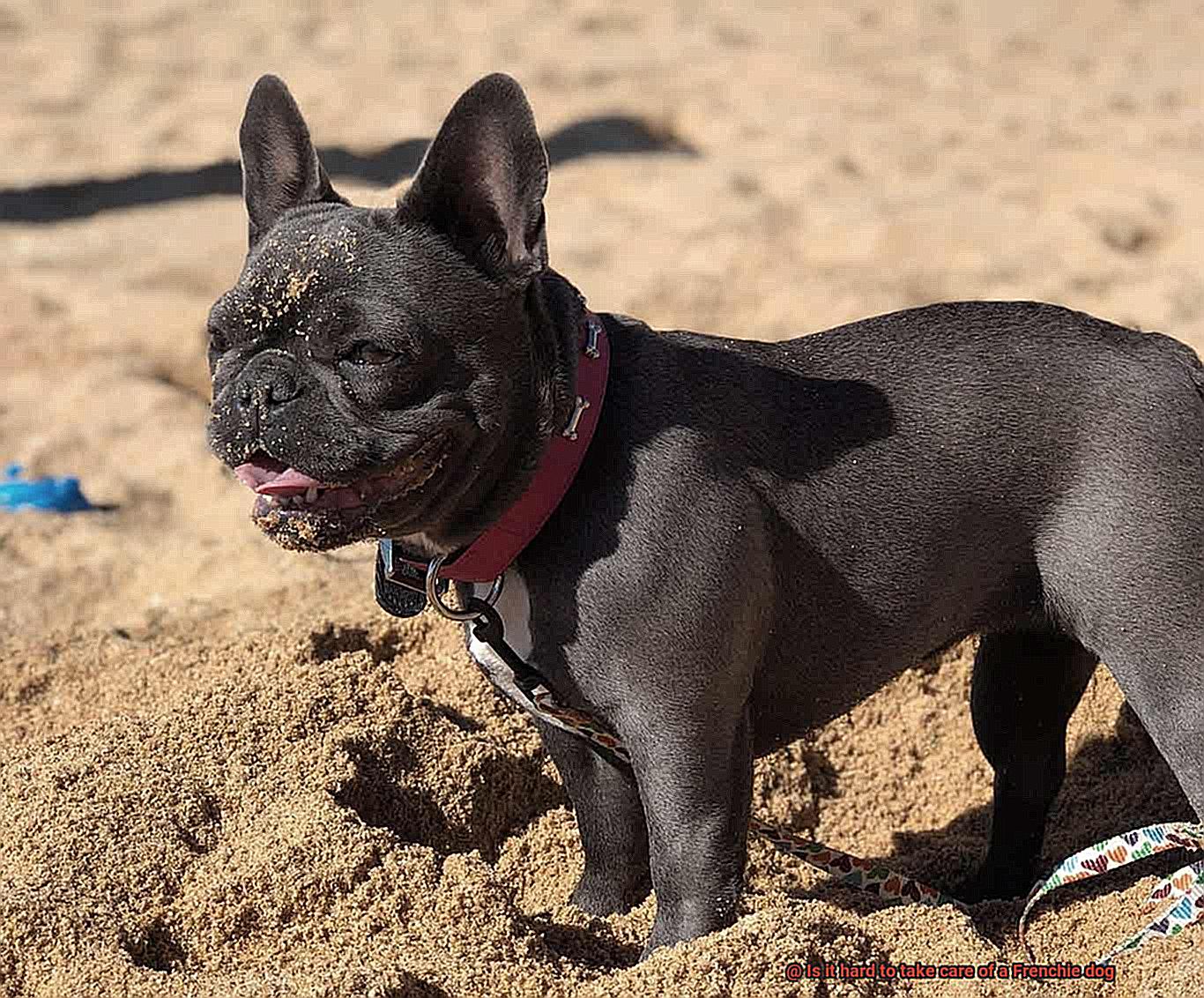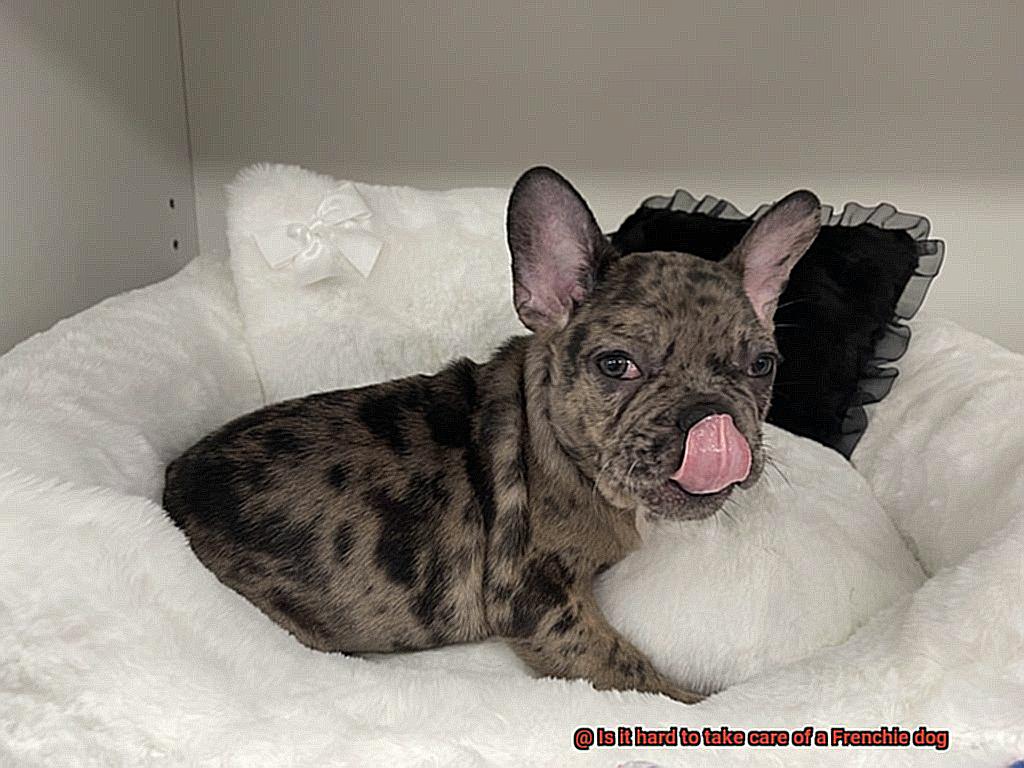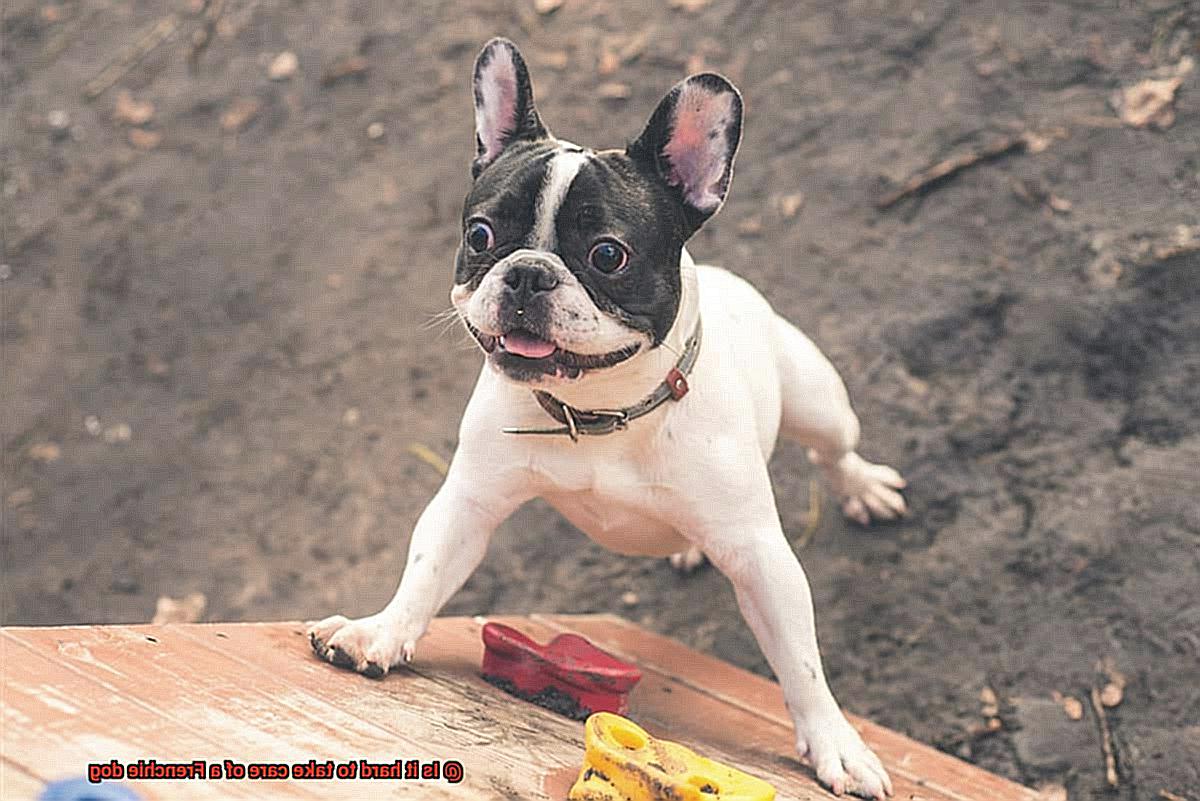Is it hard to take care of a Frenchie dog?
Ever fantasized about snuggling up with a squishy-faced, bat-eared French Bulldog? These little bundles of joy can warm even the iciest hearts.
But let me tell you, taking care of these cuties ain’t no walk in the park. Today, we’re diving deep into the world of being a French Bulldog parent.
So, grab your coffee and prepare to uncover the real deal about caring for a Frenchie dog.
Exercise Requirements for French Bulldogs
Contents
- 1 Exercise Requirements for French Bulldogs
- 2 Grooming Needs for French Bulldogs
- 3 Potential Health Issues of French Bulldogs
- 4 Dental Care for French Bulldogs
- 5 Nutrition Needs of French Bulldogs
- 6 Socialization and Training for French Bulldogs
- 7 Providing a Safe and Comfortable Environment for Your Frenchie
- 8 Conclusion
French Bulldogs have become popular pets due to their adorable looks and friendly personalities. As a responsible owner, it’s crucial to understand and fulfill their exercise requirements to ensure their overall health and well-being.
In this article, we will explore the exercise needs of French Bulldogs, providing valuable insights and tips to keep your furry friend fit, happy, and healthy.
Understanding the Exercise Needs:
French Bulldogs are a small breed with moderate energy levels. While they don’t require intense workouts like some other breeds, regular exercise is vital to prevent obesity and maintain their overall health.
The Power of Daily Walks:
A daily walk of around 20-30 minutes is generally sufficient for most French Bulldogs. You can break up this time into multiple shorter walks throughout the day if needed. Not only does walking provide physical exercise, but it also stimulates their minds as they explore their surroundings and interact with different scents.
Weather Considerations:
French Bulldogs are sensitive to extreme temperatures due to their brachycephalic (short-nosed) structure. To prevent overheating or respiratory distress, avoid exercising them during the hottest part of the day or in very cold weather.
Mental Stimulation:
Incorporating interactive toys, puzzle games, or short training sessions into your Frenchie’s exercise routine can provide mental stimulation and prevent boredom. These activities engage their minds and keep them entertained.
Low-Impact Exercise Options:
Swimming is an excellent low-impact exercise option for French Bulldogs. It offers a full-body workout without stressing their joints. However, ensure proper safety measures when introducing your Frenchie to water and supervise them closely.

Brachycephalic Breathing Considerations:
Due to their unique anatomy, French Bulldogs may experience breathing difficulties during physical activity. Avoid strenuous exercise or activities that may cause excessive panting or breathing difficulties.
Regular Exercise for Behavioral Well-being:
In addition to physical fitness, regular exercise plays a crucial role in preventing behavioral problems that can arise from boredom or excess energy. A well-exercised Frenchie is a happy and well-behaved companion.
Grooming Needs for French Bulldogs

Behind the adorable bat ears and irresistible charm of French Bulldogs lies a unique set of grooming needs. In this article, we’ll explore the essential grooming rituals that will keep your Frenchie looking and feeling their best. From brushing their smooth coat to cleaning those adorable wrinkles, we’ve got you covered.
Brushing:
French Bulldogs may have short coats, but regular brushing is still beneficial. Use a soft bristle brush or a grooming glove to show your Frenchie’s coat some love once or twice a week. Brushing helps remove loose hair, distribute natural oils, and prevent matting. Plus, it’s an excellent opportunity for bonding with your furry friend.
Bathing:
A fresh-smelling Frenchie is a happy Frenchie. Plan on bathing your pup every 2-3 months or as needed. Opt for a mild dog shampoo formulated specifically for their sensitive skin.
Avoid using human shampoos or harsh chemicals that can irritate their skin. Remember to dry them thoroughly, especially in those adorable skin folds, to prevent any moisture-related issues.
Ear Care:
Regular ear checks are crucial for French Bulldogs, as they are prone to ear infections. Gently clean their ears using a vet-recommended ear cleaner to prevent build-up and infections. Be careful not to insert anything too deep into the ear canal to avoid discomfort or injury.
Wrinkle Cleaning:
Those signature Frenchie wrinkles are undeniably cute but can also harbor dirt and bacteria. Clean their wrinkles daily with a soft cloth or baby wipe to keep them fresh and dry. Be thorough yet gentle to avoid irritation to their sensitive skin.
Nail Trimming:
Don’t forget those nails. Overgrown nails can cause discomfort and affect your Frenchie’s gait. Trim their nails every 4-6 weeks using proper dog nail clippers. Be cautious not to cut the quick, which contains blood vessels and nerves. Seek professional help if unsure.
Dental Care:
Regular teeth brushing with dog-specific toothpaste and a toothbrush is recommended to prevent plaque buildup and dental issues. Chew toys designed for dental health can also help keep those chompers in tip-top shape.
Potential Health Issues of French Bulldogs
French Bulldogs are undeniably adorable, with their cute bat ears and expressive eyes. However, behind their charming appearance lies a breed that is prone to certain health issues. As responsible pet owners, it is crucial to understand these potential health concerns and take proactive measures to keep our beloved Frenchies happy and healthy.
Brachycephalic Airway Syndrome (BAS):
French Bulldogs’ unique physical characteristics, such as their flat faces and narrowed airways, make them susceptible to respiratory issues. BAS can cause breathing difficulties, especially during exercise or in hot weather. To ensure their well-being, provide regular exercise with plenty of breaks and avoid strenuous activities in extreme temperatures.

Allergies:
French Bulldogs are often sensitive to environmental allergens like pollen, dust mites, and certain foods. Allergies can manifest as skin irritations, itching, and ear infections. Manage allergies through proper diet, regular cleaning of their living environment, and veterinary guidance for effective treatment.
Obesity:
Due to their small size and tendency to gain weight easily, French Bulldogs are prone to obesity-related health problems such as heart disease and joint issues. Maintain a balanced diet and establish a regular exercise routine to keep them at a healthy weight. Monitor food intake and avoid overfeeding for their long-term health.

Genetic Disorders:
French Bulldogs have a higher risk of genetic disorders like Intervertebral Disc Disease (IVDD). Regular check-ups with a veterinarian can help detect early signs of IVDD or other genetic conditions. Timely intervention and appropriate management can significantly improve their quality of life.
Skin Problems:
The wrinkles and folds on French Bulldogs’ skin can trap moisture, leading to bacterial or fungal infections. Regular cleaning and drying of these areas, along with proper nail and ear care, are essential to prevent skin issues and maintain good hygiene.
Heatstroke:
French Bulldogs have compromised breathing ability, making them more prone to overheating and heatstroke. Provide a cool and well-ventilated environment, access to fresh water, and regular breaks during outdoor activities to prevent this potentially life-threatening condition.
Dental Care for French Bulldogs
Here, we will delve into the world of doggy dentistry, exploring the importance of dental care for French Bulldogs. Get ready to discover easy steps to maintain your Frenchie’s pearly whites and ensure their smile shines bright.
The Importance of Dental Care for French Bulldogs:
Overcrowding Issues: Due to their compact jaw, French Bulldogs often face misalignment and overcrowding of teeth. This can impede proper chewing and hinder effective teeth cleaning, resulting in plaque buildup and gum disease.
Easy Steps for Dental Care:
- Brushing: Make brushing your Frenchie’s teeth a regular part of their grooming routine. Aim for at least two to three times a week using a dog-specific toothbrush and toothpaste. Remember, human toothpaste can be toxic to our furry friends.
- Chew Toys and Dental Treats: Provide your Frenchie with chew toys or dental treats designed to remove plaque and tartar while satisfying their natural chewing instincts. Opt for safe toys and treats that cater to their unique needs, avoiding excessively hard or small items that may cause harm or pose choking hazards.
- Regular Vet Check-ups: Schedule routine dental check-ups with your veterinarian. During these visits, the vet will examine your Frenchie’s teeth and gums, conduct professional cleanings if necessary, and offer guidance on proper dental care.
Additional Considerations:
Some French Bulldogs may require extra dental care due to specific issues or genetic predispositions. For instance, retained deciduous teeth (baby teeth that haven’t fallen out) can lead to overcrowding and complications. In such cases, your vet may recommend extracting the baby teeth to maintain optimal oral health.
Nutrition Needs of French Bulldogs
French Bulldogs are not only adorable and lovable companions, but they also have specific nutritional needs that require attention. Providing your furry friend with the right balance of nutrients is essential for their overall health and wellbeing. In this article, we will explore the key aspects of French Bulldog nutrition, from maintaining a healthy weight to supporting their sensitive digestive system.
Balanced Diet for Optimal Weight:
- Obesity is a common issue among French Bulldogs, so it’s crucial to provide them with a balanced and portion-controlled diet.
- Opt for high-quality dog food formulated to meet their nutritional requirements.
- Look for options containing lean proteins, complex carbohydrates, and healthy fats.
- Avoid overfeeding and resist the temptation to offer too many treats to prevent weight gain and related health problems.
Addressing Allergies:
- French Bulldogs are prone to allergies, which can manifest in skin irritations or digestive issues.
- Consult with your veterinarian to identify potential triggers.
- Hypoallergenic dog food or limited ingredient diets may be recommended, excluding common allergens like grains, dairy, or specific proteins.
Supporting Digestive Health:
- The sensitive digestive system of French Bulldogs requires special attention.
- Opt for easily digestible dog food with high-quality protein sources like chicken or fish.
- Avoid ingredients such as corn, soy, and wheat that can be harder to digest.
- Feed smaller, frequent meals throughout the day to prevent bloating and other digestive issues.
Protein-Rich Diet for Muscle Development:

- Protein is essential for muscle development and overall health in French Bulldogs.
- Look for dog food with at least 20% protein content.
- Lean meats like chicken, turkey, or fish are excellent protein sources.
- Be cautious with red meats, as they can be harder to digest for some French Bulldogs.

Hydration and Treats:
- French Bulldogs are prone to dehydration due to their short snouts, so ensure they have access to fresh water at all times.
- Offer treats in moderation and choose healthy, low-calorie options.
- Consider dental chews or natural treats that promote oral health while satisfying cravings.
Regular Vet Check-ups:
- Regular vet check-ups are essential to ensure your French Bulldog’s nutritional needs are being met.
- The vet can assess weight, body condition, and overall health, making dietary adjustments if required.
Socialization and Training for French Bulldogs
To ensure your Frenchie becomes the well-behaved and obedient companion you dream of, socialization and training are essential. Let’s explore the importance of socialization and training for your furry friend.
Socialization: Building Confidence and Comfort

To help your Frenchie develop confidence, expose them to various people, animals, and environments from an early age. Gradually introduce them to friends, family members, and other pets in a positive manner. Take them on walks to expose them to different sights, sounds, and smells. Expand their comfort zone consistently as they grow older.
Training: Nurturing Their Intelligence
French Bulldogs are intelligent dogs who respond well to positive reinforcement techniques. Start with basic commands like sit, stay, and come. Consistency is key – everyone in the household should follow the same rules and commands. Avoid harsh punishment or negative reinforcement methods that can cause fear or aggression.

Housebreaking: Tackling Stubborn Streaks
Frenchies can be stubborn when it comes to housebreaking. Consistent training and a regular bathroom schedule are crucial for success. Consider crate training to prevent accidents indoors.
Behavioral Issues: Seeking Professional Help

Address behavioral issues promptly. Seek professional help if needed, especially for aggression or separation anxiety. A qualified trainer or behaviorist can provide guidance and support.
Providing a Safe and Comfortable Environment for Your Frenchie

In this comprehensive guide, we will explore the key aspects of creating an ideal living space for your Frenchie, combining practical advice with a touch of casual charm.
Indoor Living Arrangements:
Maintain a cozy temperature inside your home, considering French Bulldogs’ sensitivity to extreme temperatures. Ensure adequate heating during colder months and proper ventilation during warmer months. Improve air circulation by using air purifiers or opening windows regularly to prevent respiratory issues.
Protecting Your Frenchie from Hazards:
Keep toxic plants, cleaning products, and medications out of reach. Secure electrical cords and outlets to prevent chewing accidents. Install baby gates or pet barriers to restrict access to risky areas. Consider using childproof locks on cabinets containing harmful substances.
Creating a Cozy Space:

Provide a soft and plush bed for your Frenchie to rest in comfort. Keep extra blankets handy for snuggling sessions. Ensure there is ample space for them to move around freely and play. Keep a variety of toys and interactive activities available for mental stimulation.
Flooring Considerations:
Use rugs or mats in areas where your Frenchie spends most of their time to prevent slipping on smooth surfaces. Avoid using harsh cleaning chemicals that could irritate their sensitive paws.
Maintaining a Clean Environment:
Regularly clean and sanitize their living area, including their bed, toys, and food bowls, to promote good hygiene. Stay vigilant for signs of pests and take necessary precautions to prevent infestations.
Em5WE9QFfa0″ >
Conclusion
In conclusion, caring for a Frenchie dog can be both rewarding and demanding. As we’ve delved into in this article, there are numerous factors to consider when it comes to their exercise, grooming, health, nutrition, socialization, and environment.
When it comes to exercise, French Bulldogs have moderate energy levels and require regular walks and mental stimulation to prevent obesity and behavioral problems. However, their unique brachycephalic structure necessitates caution in extreme temperatures.
Grooming a Frenchie involves a range of tasks such as brushing, bathing, ear cleaning, wrinkle cleaning, nail trimming, and dental care. Their distinctive physical features make them susceptible to respiratory issues, allergies, obesity, genetic disorders, skin problems, and heatstroke. Regular vet check-ups are vital for early detection and management of these conditions.
Proper nutrition is essential for maintaining a healthy weight and supporting their sensitive digestive system. A well-balanced diet consisting of lean proteins and easily digestible ingredients is highly recommended.
Socialization and training play a crucial role in shaping your Frenchie’s behavior. Early exposure to various experiences helps build confidence while utilizing positive reinforcement techniques proves effective for training.
Creating a safe and comfortable environment involves ensuring the right indoor temperature, safeguarding them from hazards, providing cozy spaces with soft bedding and toys for mental stimulation. Regular cleaning of their living area ensures optimal hygiene.
While caring for a Frenchie dog can be challenging due to their specific needs and potential health issues associated with their breed characteristics, the love and joy they bring make it all worthwhile.




